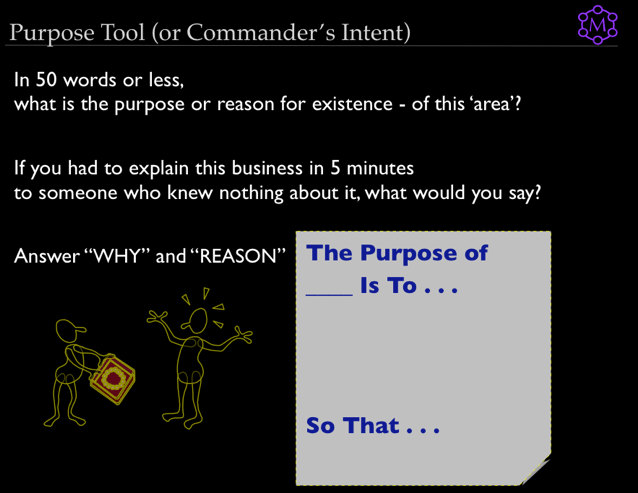Assuredly, organizational executives are known to go off-site to conduct strategic planning sessions, building consensus around vision and strategy to lead an organization to the future it seeks.
Yet infrequently, if ever, the Account Payable Department (or, some other function, process, activity, or product) justifies off-site strategic planning sessions. They still need consensus around why that department (or, some other function, process, activity, or product) exists, where they are going, and how they are going to measure their progress. To build consensual understanding around WHY something exists or WHY it is important, consider using our meeting Purpose Tool. If used appropriately, Commander’s Intent (aka, the meeting Purpose Tool) may be the second most frequently used workshop tool, after Brainstorming.
Meeting Purpose Tool (aka Commander’s Intent)
This activity yields a wonderful, group-constructed statement that captures the integrated reason, plan, scope, and benefits of a business area.
Meeting Purpose Tool Rationale
Provides the group with a consensually built backdrop that can be appealed to. Helps galvanize consensus around analytical methods and decision-making that follow.
Meeting Purpose Tool Method
Either on one easel or two separate easels, in advance, you should build out the visual prompt (preferably in a separate color), that “The Purpose of ____ is to . . . (ellipsis) So that . . . (ellipsis).”
- Prompt your participants with “The Purpose of ____ is to . . .”
- While scribing, print the last word from the previous input, and prompt them audibly with “So that . . .” because you want to keep the energy high.
- Do not use hyphens as you capture, rather use commas as you are helping them build one, long run-on sentence.
- Do not wordsmith the results but be certain to reread, review, and confirm that they have created a statement that everyone can live with. Basically, you have created a strategic plan at the level of a business area or activity—why it is important.
- Review during the workshop as an appeal to ensure that the discussion stays on topic. If necessary, either take off-topic discussion and ask that it be placed in the Issue Bin or go back and modify this statement to allow for its inclusion.
______
Don’t ruin your career by hosting bad meetings. Sign up for a workshop or send this to someone who should. MGRUSH workshops focus on meeting design and practice. Each person practices tools, methods, and activities every day during the week. Therefore, while some call this immersion, we call it the road to building high-value facilitation skills.
Our workshops also provide a superb way to earn up to 40 SEUs from the Scrum Alliance, 40 CDUs from IIBA, 40 Continuous Learning Points (CLPs) based on Federal Acquisition Certification Continuous Professional Learning Requirements using Training and Education activities, 40 Professional Development Units (PDUs) from SAVE International, as well as 4.0 CEUs for other professions. (See workshop and Reference Manual descriptions for details.)
Want a free 10-minute break timer? Sign up for our once-monthly newsletter HERE and receive a timer along with four other of our favorite facilitation tools, free.

Terrence Metz, president of MG RUSH Facilitation Training, was just 22-years-old and working as a Sales Engineer at Honeywell when he recognized a widespread problem—most meetings were ineffective and poorly led, wasting both time and company resources. However, he also observed meetings that worked. What set them apart? A well-prepared leader who structured the session to ensure participants contributed meaningfully and achieved clear outcomes.
Throughout his career, Metz, who earned an MBA from Kellogg (Northwestern University) experienced and also trained in various facilitation techniques. In 2004, he purchased MG RUSH where he shifted his focus toward improving established meeting designs and building a curriculum that would teach others how to lead, facilitate, and structure meetings that drive results. His expertise in training world-class facilitators led to the 2020 publication of Meetings That Get Results: A Guide to Building Better Meetings, a comprehensive resource on effectively building consensus.
Grounded in the principle that “nobody is smarter than everybody,” the book details the why, what, and how of building consensus when making decisions, planning, and solving problems. Along with a Participant’s Guide and supplemental workshops, it supports learning from foundational awareness to professional certification.
Metz’s first book, Change or Die: A Business Process Improvement Manual, tackled the challenges of process optimization. His upcoming book, Catalyst: Facilitating Innovation, focuses on meetings and workshops that don’t simply end when time runs out but conclude with actionable next steps and clear assignments—ensuring progress beyond discussions and ideas.




